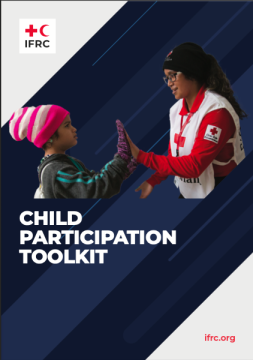This comprehensive toolkit equips National Societies with practical steps to engage children safely and meaningfully, enhancing the relevance, quality, and effectiveness of your programming. Grounded in the IFRC policies and key inter-agency standards, this toolkit provides essential guidance on running consultation processes with children, ensuring their voices are heard in every phase of program development.
Learn how to incorporate children’s insights into the design, implementation, monitoring, and evaluation of child-sensitive interventions. Whether you're assessing needs, designing new initiatives, or refining existing programs, this toolkit is an invaluable resource for creating more responsive and impactful solutions.
Inside, you'll find detailed instructions and templates for safeguarding practices, conducting focus group discussions, obtaining informed assent, and more. Empower your team with the tools to create a safe and inclusive environment where children can actively contribute to shaping their futures.
Download now to ensure your programs truly meet the needs of the children you serve and make a lasting impact in your community!
Child Participation Toolkit
Annex 1 - IFRC Child Safeguarding Risk Analysis
Annex 2 - Safer Recruitment and Induction Procedures Guidelines
Annex 3 - Recruitment and Induction Checklist
Annex 4 - Statement of Conduct template
Annex 5 - Self-declaration form
Annex 6 - Guidance on Documenting Personnel who Work with Children in IFRC Operations or Programmes
Annex 7 - Field Visits and Child Safeguarding Tool
Annex 8 - Responding to a DisclosureAnnex 8 - Responding to a Disclosure
Annex 9 - Workshop Assent - Consent Checklist
Annex 10 - Assent Form for Children
Annex 11 - Assent / Consent Form for Photo, Story, Artwork and Film
Annex 12 - Consent Form for Parents or Caregivers
Annex 13 – IFRC PSEAH Poster for Children
Annex 14 - My Protection Poster
Annex 15 - Emergency Contacts
Annex 16 – Incident Monitoring Form
Annex 17 – Referral pathways for Survivors of Sexual Exploitation and Abuse
Annex 18 - Registration Form
Annex 19 - Attendance Form
Annex 20 - Session Objective(s) Setting
Annex 21 – How to interact with children
Annex 22 - Skills for interacting with children
Annex 23 - Do’s and Don’ts for supporting participants with difficult behaviours
Annex 24 – Opening the session
Annex 25 – Explaining confidentiality - The Toothpaste Activity
Annex 26 - Community Agreement
Annex 27 – Ending the session
Annex 28 – Focus Group Discussion Guidelines
Annex 29 - Focus Group Discussion – Recording Template
Annex 30 – Survey Introduction and Conclusion
Annex 31 – Key Informant Interview Guidelines
Annex 32 – Self-care and support
Annex 33 – Questions for the development of assessment, monitoring and evaluation plan
Annex 34 - Overview of informed consent/assent for different age groups
Feelings Faces




